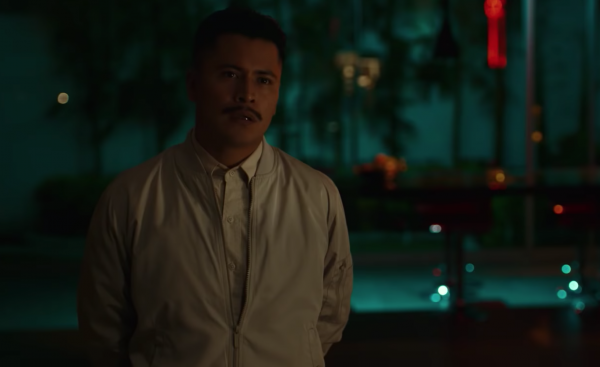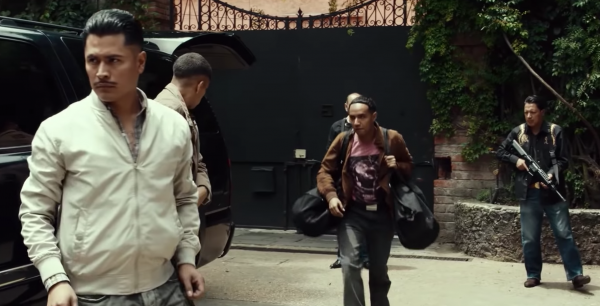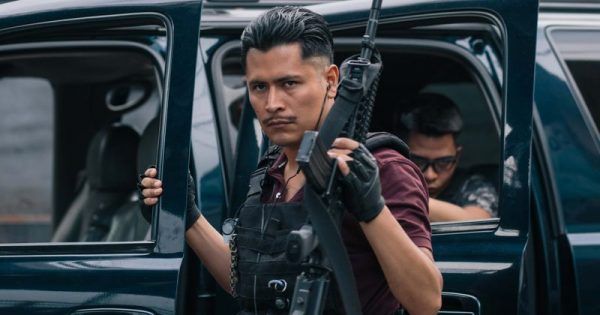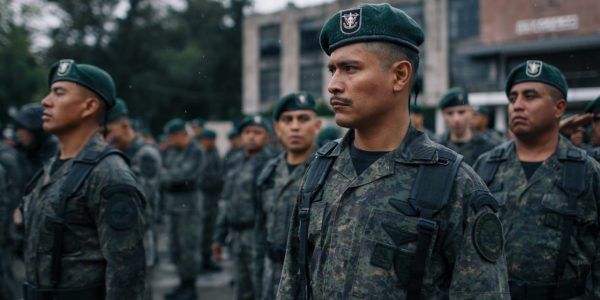Amazon's global drug drama ZeroZeroZero began streaming earlier this month -- read my review here -- and while there's plenty of action in both Italy and America, it was the scenes set in Mexico that stood out throughout the series. That's because of the actor anchoring those scenes, Harold Torres, who plays the ambitious special forces leader Manuel Contreras. Like many of my picks for Up-and-Comer of the month, I couldn't take my eyes off Torres, whose performance was called "effin' Brando good" by Steven Gaydos, the longtime features editor at Variety. Torres radiates intensity, and yet there's a vulnerability to his performance as he lets us see the softer side of his otherwise merciless character.
Torres is 36 years old and he has been acting for more than a decade, with early roles in Rudo y Cursi alongside Gael Garcia Bernal and Diego Luna, as well as Cary Joji Fukunaga's debut feature Sin Nombre. You may have also seen him in the History Channel miniseries Texas Rising with Bill Paxton, the Netflix series Ingobernable with Kate del Castillo, or the streamer's El Chapo series, in which he played Mexican drug kingpin El Cano.
In ZeroZeroZero, the roles are reversed... sort of. Contreras is a member of law enforcement, eager to stop the bad guys -- until the futility of the war on drugs hits him, and he realizes that if you can't beat 'em, join 'em. Though Torres has been nominated for three Ariel Awards, which are the equivalent of Mexico's Oscars, he has never had such a high-profile lead role before, and he makes the most of the opportunity. While Torres does not have Hollywood representation yet, several agencies and management companies have already expressed interest in signing him, and I fully expect him you'll be seeing more of him once production resumes worldwide.
I think there's something special about Torres, and that's why he's Collider's Up-and-Comer of the Month for March. Make sure to check out ZeroZeroZero on Amazon Prime Video, and enjoy our chat below. This is an actor you're going to want to keep an eye on.
(This interview has been condensed and edited for clarity)
Collider: What sparked your passion for acting and made you want to get into this crazy business?
Harold Torres: I started acting at the National University of Mexico. I never thought I'd work in film, but I've loved the arts since I was young, and I saw many movies when I was a kid. I remember when I was in school in Mexico, I looked the same as John Travolta in Grease. I remember watching Jean-Claude Van Damme movies and trying to be like him, and I cut my hair in the same way. When I was 19, I received an invitation to go to an acting workshop and after that, I was invited to another workshop with an important director in Mexico City. So my whole life changed when I decided to go to university, but I didn't understand the competition to go to this acting school. When I got in, I thought, 'oh, this is cool,' and eventually a friend of mine, Gabino Rodriguez, invited me to work with him on a short film, and that's what started in my career.
From there, I started to work very frequently in the movies, and even though I didn't have much experience acting professionally, because I'd only made two movies -- one inside of the school and one outside of the school -- I decided to do something in France before coming back to Mexico for another project. I've shot many films in Mexico City, and I've worked on different international projects from Germany, France and the United States.
Your early credits include Rudo y Cursi and Sin Nombre, the latter of which was directed by Cary Joji Fukunaga. That must've been exciting for you as a young actor, no?
Torres: Well, Sin Nombre was an incredible experience. I love the director's work, especially True Detective, but I had some complications when I was working on that movie, because at same time I was shooting another movie, and I was the second lead, whereas in Sin Nombre, it was a very little part. But it was a very impressive production and I made many friends on that set.
Tell me about the audition process for ZeroZeroZero. How did the project come to you and how did you win the role?
Torres: I went in for the casting directors in Mexico City, Alejandro Reza and Cheli Godínez, but I had a little problem because I was shooting other things in the north of the country. So at first, it was impossible. And then they figured out a way for me to see the director on a Sunday in Mexico City, and that first meeting with Stefano was important, because I really appreciate the way that he directs, and even though I felt totally comfortable with him, I was also really nervous. But I was also very excited to work with him, and in that moment, I knew I wanted to be part of this project, just based on the way that Stefano saw things and how he described my character.
So tell us about your character, Manuel Contreras, and how he fits into this story. He starts off as the leader of a SWAT team and then sees an opportunity to wield more power. Is that how you saw things?
Torres: Yes, Manuel is the leader of special forces in Mexico, and he's a bit of a younger soldier. In some ways he's very professional, and he tries to protect his men, but he also has a peculiar relationship with God, and he asks God if what he's doing is right. It's his understanding that because God doesn't stop him, God wants him to do these things. So I was impressed with this contradiction between being a religious man and being a military man, where he's very different and a little bit brutal.
Over time, this contradiction for my character was very good for me as an actor, because we need to change how we think about Manuel when we discover what's happening in his mind and how he solves the problems in front of him. He needs to make decisions, because it's completely dangerous, even for him.
How'd you celebrate when you found out you won this potentially life-changing role?
Torres: I never tell anybody when I book projects, because they can change the age [of the character] or the schedule, and sometimes you don't have the chance to continue. So I just kept the news to myself, but the problem was that I was shooting at that moment, and I had a very big fear that I wasn't going to get a chance to do the TV series, because what I was working on was running behind schedule. I was worried it was going to run into the shooting dates for ZeroZeroZero, but in the end, I was able to do it, and I started the military rehearsals with my friend.
I was completely excited, and I called my girlfriend and told her, but at the same time, I started thinking, 'what am I gonna do?' because I had to leave two other projects. But it was important me to see what I was going to do with this character, and how I was going to help create him. It drew from many, many parts of me, and took everything I had, shooting every day for three months, more or less. It helped to think about the completion, especially while shooting the action scenes, which would take a lot of energy. All the training that we did before to support the shooting days proved to be very important. There were days when I'd just come to the set, work all day, sleep, and come right back to the set. There was no time for anything else, and the mind of the character put me in a very interesting mood.
Of the three directors you worked with on this, Stefano Sollima, Pablo Trapero and Janus Metz, how are they different in your mind?
Torres: First I worked with Stefano, and he's the shit. He's completely the shit, because he's the producer as well as the director for the first two episodes, so with him, we looked at the script together and did all the preparation for the character. For me, it was very important to understand the way he works, and I have a lot of admiration for him, because when we were shooting, he was in complete control of the set and he always had a very good energy. I was surprised, I never saw him fail, and he gave me the strength to try to do my best. I'm completely grateful to him that he gave me this big opportunity to create Manuel Contreras with the team. He asked what I think about the costumes and the character. He gave me the opportunity to be part of this process in a creative way.
After that, I worked with Janus Metz, and I've seen movies from him before, like the one about the tennis players [Borg vs McEnroe], and I was very happy when I found out I'd be working with him. The things I worked with him on were different, because with Stefano, most of the time it was action scenes, and Janus helped me find the soul of character, and expand on what I'd started building with Stefano.
And after that, I worked with Pablo Trapero. I met him a long time ago when he was on a festival jury, and at that moment, I knew I wanted to work with him, and was very excited to do so. With Pablo, there are many times he encourages improvisation, so that's another way they were all different.
Are there any actors you admire or whose careers you'd like to emulate?
Torres: I admire many, many actors. Philip Seymour Hoffman, for me, was amazing, and I loved the way that he created complex characters. I love Vincent Cassel from France. One actor who was always really impressive to me was Klaus Kinski, the German actor who worked with Werner Herzog. I love him very much, because I love his power. I even read his book, All I Need Is Love. In some ways, he's like a beast or a monster, but the only thing he needs is love. And that idea was very important, because sometimes I have to create a monster -- like Manuel -- but on the other hand, you have to care about him.
Another actor I admire is Joaquin Phoenix. He's a very risky actor, and very dedicated. I also love Daniel Day-Lewis. I love Ricardo Darín from Argentina. I love Alfredo Castro. I love the character of Oldboy. I love the characters of Johnny Depp, and I also love Brad Pitt and his projects.
Are there any filmmakers you want to work with?
Torres: I'd love to work with Jim Jarmusch and with Werner Herzog. From Mexico, if I had the chance to work with Carlos Reygadas, I'd do it. I'd also love to work with David Fincher and Quentin Tarantino. I hope to get the opportunity to work with many directors I love, because for me, movies are something that give me emotional support. Sometimes, when I feel down or when I feel sad, movies give me the chance to feel better.
Are there any big franchises you'd like to be a part of, like a Marvel movie or something like that?
Torres: I don't know if there will be another season of Mindhunter, but I'd love to be on that show if it's possible. The OA is another one I'd love to be part of, but I don't know if there will be another season of that. I'd love to work with the Wachowskis on something like The Matrix. I don't love the Marvel characters, but I love Christopher Nolan's Batman movies.
Are you talking to U.S. representation at all, as far as agents and managers are concerned? Do you know what's next for you?
Torres: Yes, but right now, I need to check with my representation in Mexico. I'm not shooting anything right now, I'm waiting for something soon, but I can't say anything about it, because I have to see if we're going to sign.
Is there anything else you'd like readers to know about you, Harold?
Torres: I'm very happy to work on this project, not just as an actor, but because the only way to solve this drug conflict is to put forth the idea that it's more complex than, 'here are the good guys, and here are the bad guys.' That's why the Panama Papers were so important, because they revealed the offshore companies that serve to launder money, which makes drug trafficking a multinational problem. Most of the time when people think about narcos, they think about Columbia and Mexico, but everybody around the world, poor countries and rich countries, have a hand in this business. It's a big, important business in the world economy, and that idea was very important, because the only way we can resolve these problems, like security and healthcare, is for the world to come together and talk about them.





